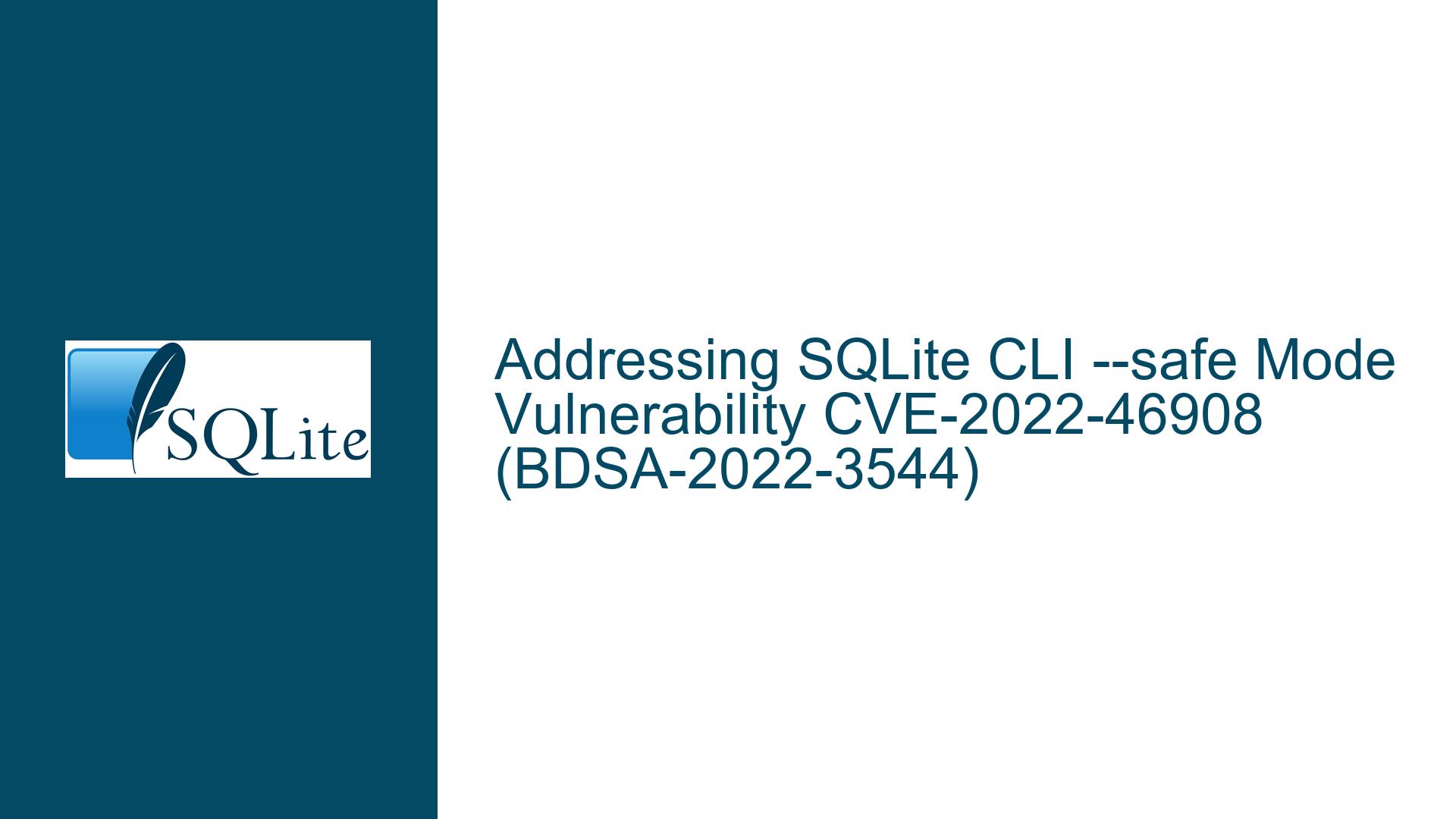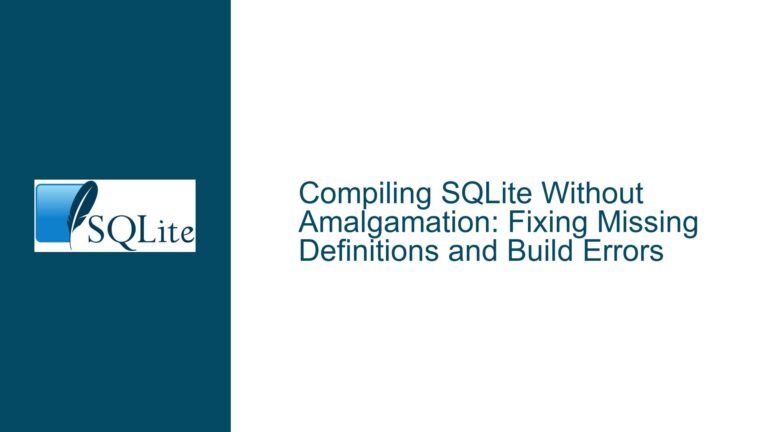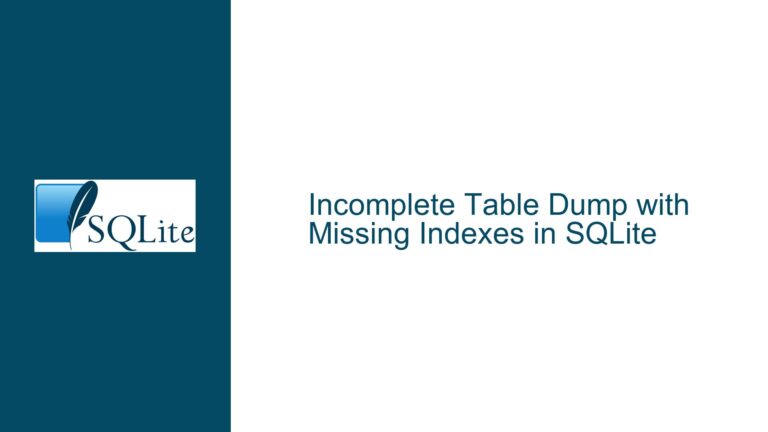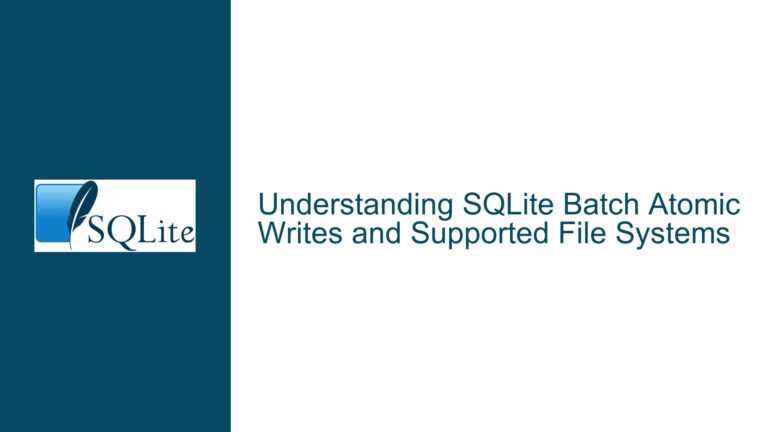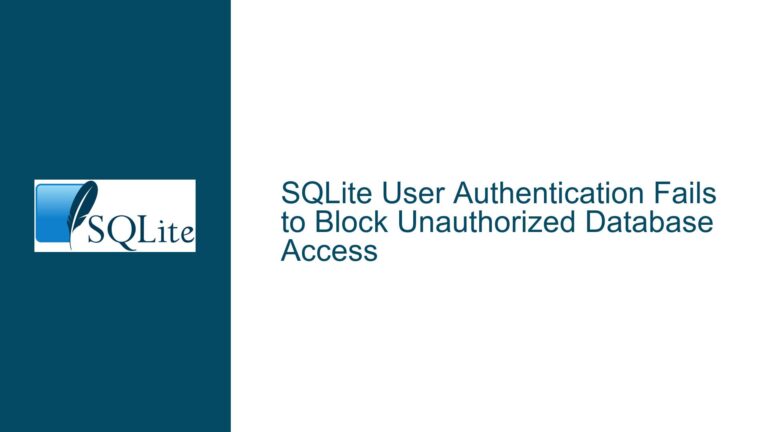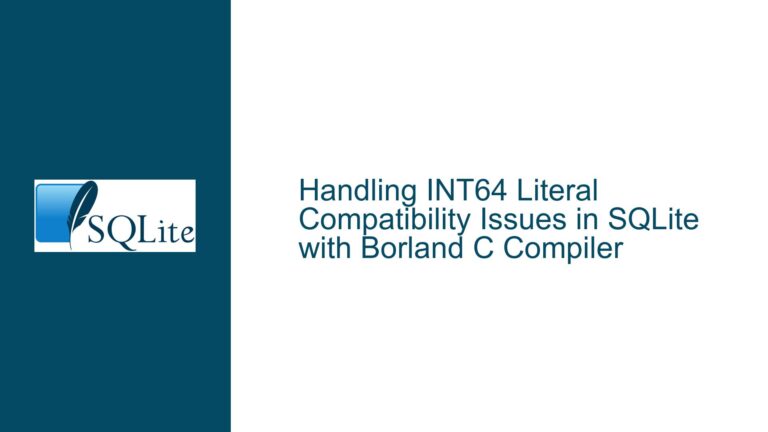Addressing SQLite CLI –safe Mode Vulnerability CVE-2022-46908 (BDSA-2022-3544)
Understanding the Scope and Impact of CVE-2022-46908 in SQLite CLI
CVE-2022-46908 (also referenced as BDSA-2022-3544) is a security vulnerability affecting the SQLite Command-Line Interface (CLI) tool when operating in --safe mode. This vulnerability allows untrusted scripts executed via the CLI to bypass the azProhibitedFunctions protection mechanism, enabling the execution of restricted User-Defined Functions (UDFs) such as WRITEFILE. The core issue lies in the incomplete enforcement of function restrictions designed to prevent unauthorized file system operations.
Affected Versions:
- SQLite CLI versions 3.39.4 and earlier.
- SQLite CLI version 3.40.0.
Key Clarifications:
- The vulnerability exclusively impacts the SQLite CLI application, not the SQLite library itself. Applications embedding SQLite as a library are unaffected.
- The
--safemode is intended to restrict unsafe operations when executing untrusted scripts. However, the flawed implementation ofazProhibitedFunctionsin the CLI allowed bypassing these restrictions. - The vulnerability has existed since the introduction of the
--safefeature, making all prior CLI versions with this feature susceptible.
Risk Profile:
- Severity: Initially classified as Critical (CVSS 9.8), later downgraded to High (CVSS 7.3) due to its limited scope (CLI-only impact).
- Attack Vector: Requires an attacker to supply a malicious script to the CLI with
--safemode enabled. - Impact: Unauthorized file writes, data corruption, or privilege escalation via UDFs like
WRITEFILE.
Misconceptions:
- The SQLite library (e.g.,
sqlite3.cor compiled binaries) does not expose this vulnerability. Only the CLI tool is affected. - The CVE entry conflates the CLI and library components, leading to confusion about the actual attack surface.
Root Causes of the –safe Mode Bypass in SQLite CLI
The vulnerability stems from a design oversight in how the SQLite CLI enforces function restrictions under --safe mode. The azProhibitedFunctions array is designed to block specific UDFs deemed unsafe for untrusted script execution. However, the CLI failed to properly validate UDF invocations, allowing prohibited functions to execute despite --safe mode being active.
Technical Breakdown:
Incomplete Function Validation:
- The CLI’s
--safemode relies on a static list of prohibited functions (azProhibitedFunctions). - During script execution, the CLI did not perform runtime checks to ensure prohibited functions were disabled.
- The CLI’s
UDF Registration Mechanism:
- The SQLite library allows UDFs to be registered at runtime.
- The CLI’s
--safemode did not account for UDFs registered via extensions or dynamic loading, bypassing static prohibitions.
Historical Implementation Flaw:
- The vulnerability has persisted since the introduction of
--safemode. Earlier versions of the CLI lacked granular control over UDF execution contexts.
- The vulnerability has persisted since the introduction of
Environmental Factors:
- Use of Untrusted Scripts: The vulnerability is only exploitable if the CLI processes untrusted scripts with
--safemode enabled. - Misconfigured Toolchains: Build systems or automation pipelines using the CLI for script execution without additional sandboxing are at higher risk.
Library vs. CLI Distinction:
- The SQLite library does not enable UDFs by default. Applications must explicitly register UDFs, making the library immune to this vulnerability.
- The CLI’s interactive nature and support for extensions create a larger attack surface compared to the library.
Remediation Strategies for CVE-2022-46908 in SQLite CLI
Immediate Mitigations:
Apply the Official Patch:
- The SQLite team resolved the issue in the source code repository. The fix involves enhancing the
azProhibitedFunctionsenforcement logic to block UDFs likeWRITEFILEduring--safemode. - Patch Reference: Forum Post 07beac8056151b2f provides details on the code changes.
- The SQLite team resolved the issue in the source code repository. The fix involves enhancing the
Upgrade to a Fixed CLI Version:
- Rebuild the CLI from the patched source code or wait for an official release containing the fix.
- Verify the CLI version with
sqlite3 --versionand ensure it includes the commit07beac8056.
Disable CLI UDFs in Untrusted Contexts:
- Avoid using the CLI’s
--safemode for executing untrusted scripts. Instead, use sandboxed environments or disable UDFs entirely via compile-time options (e.g.,-DSQLITE_OMIT_LOAD_EXTENSION).
- Avoid using the CLI’s
Long-Term Best Practices:
- Audit Script Execution Workflows: Identify automation pipelines or tools relying on the SQLite CLI and enforce input validation for scripts.
- Leverage the Library Instead: For embedded use cases, prefer the SQLite library over the CLI. The library’s security model is more robust, as UDFs require explicit registration.
- Monitor CVE Updates: The SQLite team maintains a vulnerability page with up-to-date advisories. CVE-2022-46908 is now listed with contextual notes about its CLI-specific impact.
Adjusting Security Tooling:
- Reclassify Severity: Security scanners often misinterpret CVEs affecting the CLI as library vulnerabilities. Update internal risk assessments to reflect the CLI’s isolated role.
- Version Detection Workarounds: Some tools rely on version numbers to detect vulnerabilities. If using a patched but unversioned CLI build, whitelist the binary based on its checksum or build timestamp.
Collaborative Actions:
- Engage with NIST: As demonstrated in the forum thread, request CVE reclassification to reflect the CLI’s limited scope. This reduces false positives in vulnerability reports.
- Vendor Communication: If distributing software with the SQLite CLI, notify users about the patched versions and provide upgrade guidance.
Conclusion:
CVE-2022-46908 highlights the importance of distinguishing between the SQLite library and CLI in security assessments. While the vulnerability poses risks in specific CLI usage scenarios, its impact is mitigated through source code patches, workflow adjustments, and proper segmentation of trusted/untrusted execution environments. Developers should prioritize isolating the CLI from untrusted inputs and transitioning critical operations to the library where feasible.
